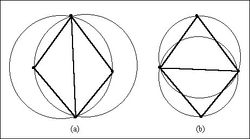GMS:Triangulation
A TIN is constructed by triangulating a set of vertices. The vertices are connected with a series of edges to form a network of triangles. The resulting triangulation satisfies the Delaunay criterion. The Delaunay criterion ensures that no vertex lies within the interior of any of the circumcircles of the triangles in the network as shown below:
The result of enforcing the Delaunay criterion is that long thin triangles are avoided as much as possible.
The vertices associated with the active TIN can be triangulated using the Triangulate command from the TIN menu, or by right-clicking on the TIN in the Project Explorer and selecting the Triangulate command. The same Triangulate commands exist for 2D mesh in the Mesh menu or by right-clicking on the mesh.
GMS also contains settings for triangulation in the Preferences dialog for both TINs and meshes.
See also
GMS – Groundwater Modeling System | ||
|---|---|---|
| Modules: | 2D Grid • 2D Mesh • 2D Scatter Point • 3D Grid • 3D Mesh • 3D Scatter Point • Boreholes • GIS • Map • Solid • TINs • UGrids | |
| Models: | FEFLOW • FEMWATER • HydroGeoSphere • MODAEM • MODFLOW • MODPATH • mod-PATH3DU • MT3DMS • MT3D-USGS • PEST • PHT3D • RT3D • SEAM3D • SEAWAT • SEEP2D • T-PROGS • ZONEBUDGET | |
| Aquaveo | ||
